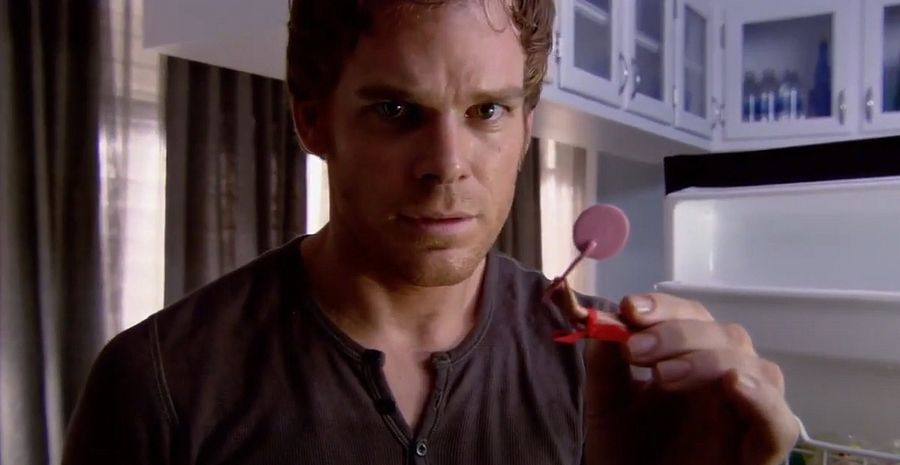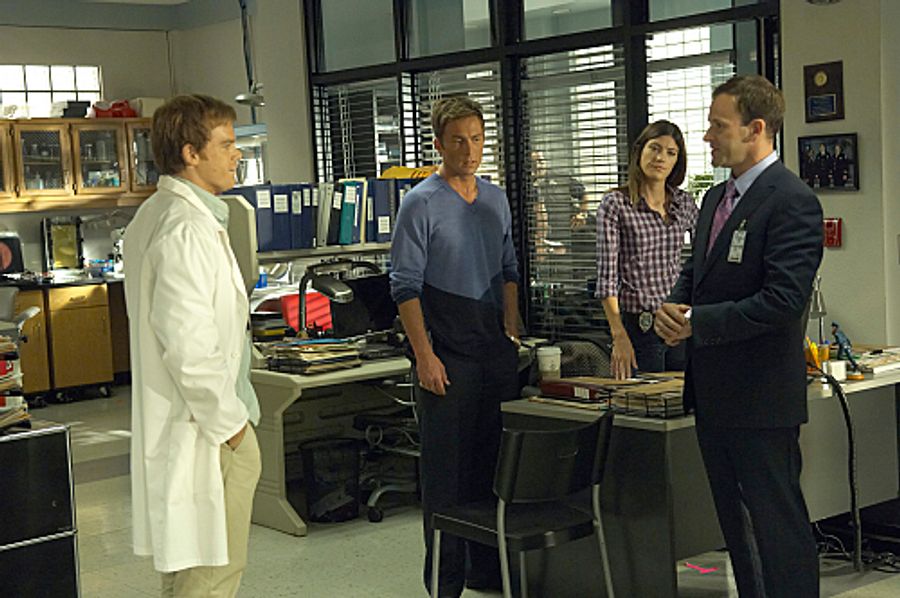We revisit 'Dexter' ahead of its comeback
Ahead of the debut of 'Dexter: New Blood' next week on Sky Atlantic, we will be breaking down the story of Dexter Morgan. Spoilers ahead! (Seriously, we spoil the entire series)
Debuting in 2006, 'Dexter' quickly became a favourite with critics and audiences alike.
Based on the 'Darkly Dreaming Dexter' books by Jeff Lindsay, the show stars Michael C Hall as Dexter Morgan, a forensic analyst by day with the Miami Police Department, and a vigilante serial killer by night.
The show helped codify the "anti-hero" character archetype that became so prevalent in the TV shows that followed - think Bryan Cranston in 'Breaking Bad' or Jason Bateman in 'Ozark' - where a nice, unassuming person possesses some terrible secrets behind the facade.
In 2021, the idea of a white male with dark secrets is a tired trope bordering on cliche, but when 'Dexter' first aired in 2006, it was a breath of fresh air and a genuine novelty.
Michael C Hall received five Emmy nominations for playing Dexter Morgan (he lost to Bryan Cranston four times and Kyle Chandler once) and without him, the show fundamentally does not work.
Storylines on the show ranged from the sublime (John Lithgow's memorable season-long villain role) to the atrocious (the entire final season, just why?) but at the centre of it all was Michael C Hall's charming yet eerie turn as the titular character.
No matter how outlandish the show gets - and it does - Hall has a consistent detached demeanour which is oddly grounding.
Serving as the show's narrator, Hall's disinterested, off-kilter narration adds a surreal charm to the show.
Hall had already established himself as a star with 'Six Feet Under', but 'Dexter' was the first time he carried a show on his sheer presence, and it's genuinely effective. For all the positive and negative parts of 'Dexter', Hall is at the heart of it.

The hook for the show - a forensic investigator tracks down criminals who escaped the clutches of the legal system - is a clever one, and operates in a grey area that forces the viewer to question if they support vigilante justice or not.
The show makes it abundantly clear that Dexter is not a serial killer who targets innocent people - his targets are those who escaped the legal system.
It's a very clever idea for a show, and the show truly shines when it explores the grey area surrounding Dexter's motives.
The first season is assured straight out of the gate, with the Ice Truck Killer serving as a worthy rival to Dexter and establishing what the show is about; a deeply damaged man following his moral code.
An early high point for the show is the arc where James Doakes, a co-worker of Dexter, correctly suspects that there is something off with him.
Established in season one, the dynamic between Doakes and Dexter drives season two, and the show is at its sparkling best when there's an element of dramatic irony in play.
Doakes is on the trail of Dexter, and the audience knows Dexter is guilty as sin. However, you nearly want Dexter to get away with his crimes because Doakes is such an aggressive, unpleasant presence in Dexter's life.
When the show is cooking with fire like the Doakes storyline, the show really is as good as you remember.
However, 'Dexter' was unique in another way: for one truly brilliant storyline or arc, there was at least another terrible one to balance it out.
Season three is overall a decent season overall ('The West Wing' star Jimmy Smits takes chunks out of the scenery whenever he's on screen) but the core arc driving that season isn't terribly interesting in comparison to the first season's Ice Truck Killer or season two's cat-and-mouse game with Doakes.
Season four is the high point of the show; Dexter is juggling his family life and secret one, John Lithgow is terrifying as the Gemini Killer, then the season is pile-drived by Batista and LeGuerta's relationship.
Slowing down a tense season with a gushy relationship that would feel more in place in an episode of 'The O.C.' is a symptom of how 'Dexter' tried to keep too many plates spinning, a tactic that would backfire in later seasons.
Some plotlines get too much screentime - we get it, Deb is bad at romance! - and others are underdeveloped and needed a lot more room to breathe, such as Peter Weller's Stan Liddy being introduced as a potential adversary for Dexter, being dispatched of, and the character is never mentioned again.
Fans of the show note that the show's decline began after showrunner Clyde Phillips left after season four. Under his stewardship, had it's strongest seasons and the greatest level of critical acclaim.
The finale of season four is the undisputed high point of the show; having dispatched of John Lithgow's Trinity Killer, Dexter seems to be free of his greatest threat yet, and looks set to continue his blissful suburban life with his wife Rita.
Dexter returns home to find that his wife Rita (played by 'Buffy' alum Julie Benz) has fallen victim to the Trinity Killer.
It's as genuinely shocking an ending you get on TV, and the shows peak.
'The Getaway' was the final episode Phillips had a direct hand in, and the decline that sets in after the fact becomes shockingly clear.
The first post-Phillips season had its moments, with Julia Stiles' plotline being strong and Jonny Lee Miller proving to be a decent season-long villain, but coming off such a strong season would be a tall order for any show, let alone a show with such a spotty track record like 'Dexter'.

Even in its good seasons, there was always a bad plotline just around the corner, so in the seasons when the main arc isn't as dramatically interesting or well-written as seasons past, the bad plot lines become a black hole and swallow the show whole.
Before the ruinous final season, season six is when the shows fatal flaw is exposed: if the main plotline is bad, the sub-plots have to pull their weight, and in this season it becomes clear as day the show is in a tailspin.
The main plotline is a decent starting point - the killers this season base their killings on the Book of Revelations - but it becomes increasingly outlandish and the resolution of the plotline where it turns out Dexter wasn't the only character with an invisible friend.
When an entire season of dramatic conflict with the villain is revealed to have been as relevant to the plot as an episode of 'Scooby-Doo' the goodwill one has for the show goes out the window.
The penultimate season is a welcome return to form, with the uneasy alliance between Dexter and Deb serving as a great dramatic throughline for the season to follow, the addition of 'Chuck' and 'The Handmaids Tale' alum Yvonne Strahovski was a smart late-game tactical change to the cast, and the dramatic juice of LaGuerta closing in on Dexter puts the colour back in the shows cheeks.
'Dexter' and its final season had the misfortune of airing at the same time 'Breaking Bad' was wrapping up its historic run.
Critics at the time were not kind to 'Dexter' but was this a case of being up against one of the titans of "Peak TV"?
A little-seen cable show had grown from word-of-mouth critical darling to bonafide cultural sensation. The final season of 'Breaking Bad' is a perfect example of how to end a beloved show; remember what made the show great, tie up any existing loose ends, but leave enough unanswered to leave the fans wanting more.
'Dexter' followed the same formula, and failed at all three parts.
'Dexter' was from a different period. It was certainly successful from a critical and viewership standpoint, but it was dwarfed by 'Breaking Bad' and 'Mad Men' as the shows run continued.
Granted, the show aired on Showtime meaning it could get away with darker content and storylines and content restrictions aren't a thing on premium cable, but 'Dexter' was sloppy and inconsistent when it came to other shows of the era.
Scenes like the above looked slapdash and amateurish in comparison to the mirror-shined perfection 'Breaking Bad' and 'Mad Men' were turning in week in, week out.
The trifecta of any good final season of TV is a very simple formula to follow, but for reasons unknown 'Dexter' sabotaged any goodwill it had built up over the years, both critical and commercial.
'Game Of Thrones' fans may feel hard done by that their final season was a disaster, but card-carrying 'Dexter' fans will always be there to tell them "I told you so."
The revival certainly appears interesting, and the return of Clyde Phillips in the hot seat is enough to get me to watch.
If the revival can even come close to the dizzying highs of the first four seasons, the endeavour will have been worth it.
'Dexter: New Blood' will air on Sky Atlantic this month.

